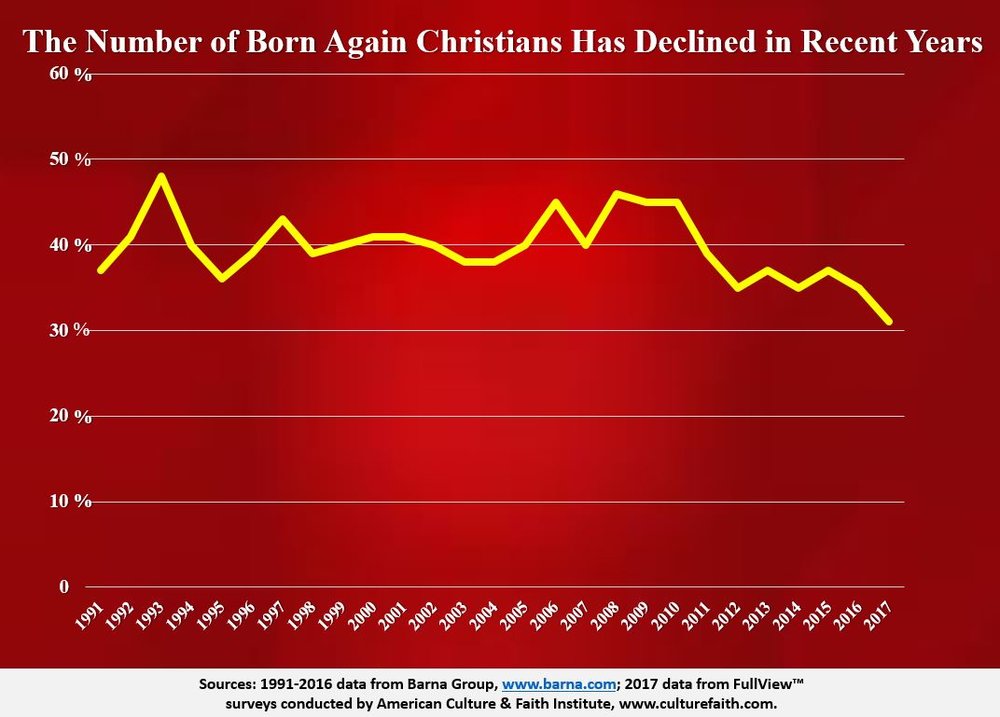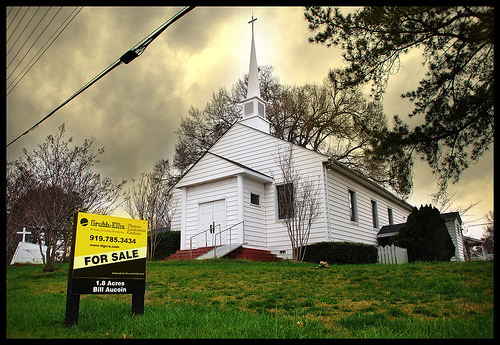From a high of about 48% of the US population in 1993 to a low of 31% in 2917.
Just to be clear, "
born again" refers a person who has "
confessed their personal sin, asked Jesus Christ to save them, and believes they will live eternally in Heaven only because of His grace toward them."
According to the linked article, the trend isn't likely to reverse itself in the near future.
"As older Americans pass away, the population proportion of younger adults will increase, continuing to drive down the born again proportion in the years to come. Children and teenagers are exhibiting a lower likelihood of becoming born again, too, further limiting the possibility of the growth of this segment.
The most noteworthy shift in the last two decades, however, is the fact that almost four out of ten born again Christians (38%) currently say that they are Christian but neither Protestant nor Catholic.
George Barna, the researcher and author who has been reporting on these trends for more than three decades, commented that the current ACFI survey is consistent with the religious patterns he has been describing in his research since the early 1980s.
“Christianity in America is going through a time of substantial challenge,” Barna stated. “The Church at-large is not likely to grow in the future unless some fundamental changes in practice are made.
source
So, what do you think this bodes for Christianity in the USA?
.
Hopefully it indicates a return to healthier versions of Christianity. Much of American Christianity has been almost exclusively in the theoretical room of ideas--one is saved by adhering to a certain amount of intellectual propositions, and is not expected to live their faith in any appreciable manner outside of reading a holy book and warming a part of a pew on Sunday morning. American Christianity to a large extent has not been about transforming the life of the Christian and making them into a better person or about making the community or society better, but about impressing a system of ideas, a way of thinking and a political agenda to be slavishly adhered to at the voting booth. If anyone DOES improve their behavior and clean up their life, it's not because they worked together with God and prayed and struggled, but because they just don't believe hard enough yet. It's been run like a multi-level marketing scheme where once you've been discipled and "born again", it's now your job to go out and disciple other people--usually by telling them that they're wrong and hellbound and they have to accept what you tell them because it's written in this book you're waving in their face. And if the Holy Spirit hasn't WWE-style elbow-dropped them and magically transformed their lives in a single instant, well, those people just don't have grace yet and they're just not saved yet.
Many churches are already taking the hint that maybe Jesus really meant it when He said that we should be taking care of the poor and sick, clothing the naked, visiting the elderly and the imprisoned, feeding the hungry, denying ourselves and taking up our cross. And maybe we're supposed to be transformed from glory to glory in the Holy Spirit and love one another. Maybe we're supposed to be loving, patient, kind, merciful, forgiving of our enemies, be good fathers and mothers, and meet people where they're at. Maybe a lack of this has been what's killing American churches, and why congregations who start doing these things consistently see a massive turnaround.


